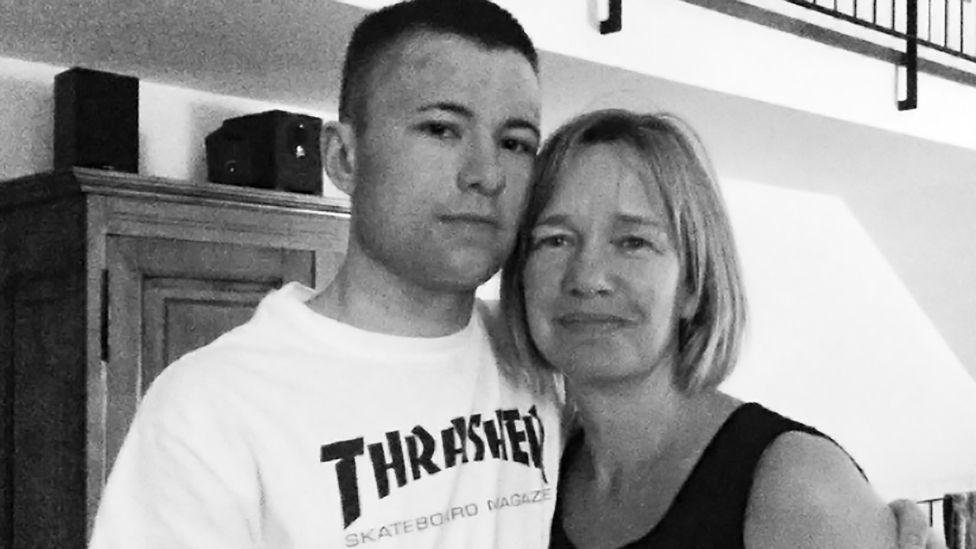'Taking anti-depressants helped me flourish'
Chloe Hayden says anti-depressants enabled her to live a "normal" life without horrendous panic attacks
- Published
Chloe Hayden said her life changed after a head on car crash which left her suffering multiple panic attacks a day.
The 22-year-old said taking anti-depressants was the "best thing she had ever done" for herself.
More than seven million prescriptions for anti-depressants were given in Wales in 2022-23 compared with 2.1 million in 2002-03 and Mind Cymru has called for urgent action to address the root causes of poor mental health.
The Welsh government said a new mental health strategy would be published in the spring.
NHS board's £1m a month to send patients elsewhere
- Published1 May 2024
'Mental health unit restraints made me more unwell'
- Published16 September 2024
More antidepressants prescribed but therapy down
- Published17 February 2021
Chloe, from Cardiff, said she started having panic attacks following a head-on car crash nearly four years ago.
Her partner Sam was driving when another car crashed into them.
When Sam got out to check the damage, Chloe said he became sandwiched between the two cars.
"It was traumatic, I thought the car was going to burst into flames and I thought I was going to die," she said.
"All I heard was [Sam] scream in pain. I genuinely thought he was going to die. The car was filling up with smoke."

Chloe Hayden, pictured here with partner Sam, said she had daily panic attacks for a few months before taking anti-depressants
While they both recovered from the physical injuries, Chloe struggled with the effects the crash took on her mental health and had multiple panic attacks a day.
She said her chest would tighten, her heart rate would increase, and added it felt like she could not breathe.
"I would have this feeling of 'oh my gosh, I'm going to die, I'm going to have a heart attack, this is it, this is my time'," she said.
She was prescribed anti-depressants and said she "never looked back".
"It's the best thing I've ever done for myself, from having multiple panic attacks a day to not having any in nearly four years. It's so freeing."
She has also received other forms of therapy which have helped too.
Chloe has since written a children's book about mental health and is in her third year of university, where she is studying counselling and therapeutic studies.
She has also competed in international pageants and won the title of Miss Voluptuous Wales.
The NHS says anti-depressants are used to treat clinical depression, external, as well as obsessive compulsive disorder, anxiety and post-traumatic stress disorder.
While they can treat the symptoms of depression, they do not always address its causes, which is why they are usually used in combination with therapy.
Dr Phil White is deputy chairman of the British Medical Association's Welsh council.
He said he had seen an increase in the number of patients with mental health issues and that at least 30% of a doctor's workload dealt with mental health.
"The problem has got worse with the cost of living, the pressures of work and the Covid pandemic," he said.
He said ideally there would be instant access to talking therapies, such as counselling, for patients.
"Unfortunately the wait for some of these is months and patients want help immediately, that's the reason we tend to start anti-depressant therapy," he said.
Mind Cymru has now called on the Welsh government to lead a nationwide effort to address the root causes of poor mental health.
They have published a report which aims to give an overview of mental health, external in Wales.
Mind Cymru said it was positive people were coming forward to seek help, but many were unable to access the support they needed in a timely fashion.
Simon Jones, head of policy and campaigns at Mind Cymru, said those working on the frontline were doing an "amazing job".
"We need to see how we can support people at an earlier stage so they don't become more unwell and when they do need the help, it's available quickly," he said.
He added more robust data was needed for a clearer picture of mental health services in Wales.
"Behind every data point is a person and their experiences, without the data we don't know how the system is responding," he added.
There has long been a debate about how effective anti-depressants are. The most comprehensive research, from the University of Oxford, suggests anti-depressants do help some people, at least in the short-term.
But there is some evidence to suggest that long-term anti-depressant use may be linked to some health risks, such as heart problems, and diabetes. It is also thought that long-term use may lead to a higher risk of withdrawal symptoms in some people.
The Welsh government said it was committed to improving access to mental health services, which included 24/7 urgent mental health support from its 111 press 2 service.
"We also provide online cognitive behavioural therapy which can be accessed at any time, without the need for referral from a health professional.
"Our long-term approach is to reduce the need for specialist services through prevention and earlier intervention.
"This will be set out in our new mental health and wellbeing strategy that will be published in the spring."
How to spot depression in adults
While most people go through periods of feeling down, feeling persistently sad for weeks or months, rather than just a few days, could be a sign of depression, external.
It affects people in different ways, but the NHS says symptoms can range from, external lasting feelings of unhappiness and hopelessness, to losing interest in the things you used to enjoy and feeling very tearful.
Many people with depression also experience symptoms of anxiety, external and physical symptoms such as fatigue, loss of appetite and sleep difficulties.
If you have been affected by the issues discussed in this story, the BBC Action Line web page features a list of organisations which are ready to provide support and advice.
- Published19 June 2023

- Published9 August 2023

- Published6 June 2024
